Counter Proposal Letter
[Your Name]
[Your Address]
[City, State, ZIP Code]
[Email Address]
[Phone Number]
[Date]
[Recipient's Name]
[Recipient's Designation/Position]
[Company/Organization Name]
[Address]
[City, State, ZIP Code]
Subject: Counter Proposal
Dear [Recipient's Name],
I hope this letter finds you well. I am writing in response to the proposal I received from your esteemed organization on [date]. Firstly, I would like to express my appreciation for the opportunity to review your proposal and for the interest you have shown in collaborating with me/us.
After careful consideration and evaluation of the proposed terms and conditions, I have compiled a counter proposal that I believe better aligns with our requirements and objectives. The following are the key points of my counter proposal:
1. Scope of Work: While I find the scope outlined in your proposal to be comprehensive, I propose some minor adjustments to better tailor the project to our specific needs and to ensure optimal outcomes. I believe these changes will enhance the project's overall effectiveness and efficiency.
2. Deliverables and Timeline: The proposed timeline is ambitious, and I commend your dedication to meeting deadlines. However, I propose a slightly extended timeline to allow for thorough research, development, and testing, which will ultimately result in a higher-quality end product.
3. Payment Terms: Your proposed payment terms are acceptable, but I would like to suggest a modification in the payment schedule to better accommodate our financial planning. Specifically, I propose spreading the payments into four equal installments, with the first payment being made upon the project's initiation.
4. Intellectual Property Rights: It is crucial to clarify the ownership of intellectual property resulting from this collaboration. I propose that all rights to intellectual property developed during the project be jointly owned by both parties, ensuring a fair and mutually beneficial arrangement.
5. Confidentiality and Non-Disclosure: While I respect the importance of maintaining confidentiality, I believe the non-disclosure clause in the original proposal requires some clarification. I propose revising the language to ensure that both parties' sensitive information is adequately protected.
6. Termination Clause: To safeguard the interests of both parties, I propose a termination clause that outlines the conditions and process for terminating the agreement. This will provide a clear roadmap in case unforeseen circumstances arise during the collaboration.
7. Additional Services: I have identified certain complementary services that would enhance the project's success. I propose incorporating these services into the agreement to maximize the benefits of our partnership.
Please find the attached detailed counter proposal, which provides a comprehensive overview of the changes and adjustments I am suggesting. I believe that these revisions will lead to a more mutually beneficial and successful collaboration.
I am open to discussing any aspects of this counter proposal and am confident that we can find common ground to move forward. I eagerly await your response and the opportunity to finalize the agreement in a manner that satisfies both parties.
Thank you for your understanding and consideration. I am excited about the potential of this partnership and look forward to working together to achieve our shared goals.
Sincerely,
[Your Name]
Professional Counter Proposal Letter for Business Contract
Dear [Recipient Name],
Thank you for sharing your proposal regarding [project, contract, or service]. After careful review, we would like to submit a counter proposal for your consideration.
We propose the following modifications:
1. [Change 1 – e.g., timeline adjustment]
2. [Change 2 – e.g., payment terms]
3. [Change 3 – e.g., scope of work]
These changes reflect our operational requirements while ensuring mutual benefits. We remain committed to collaboration and hope to reach a satisfactory agreement.
Please let us know your thoughts at your earliest convenience.
Sincerely,
[Your Name]
[Your Position]
[Company Name]
Casual Counter Proposal Email for Freelancer Work
Hi [Client Name],
Thanks for sending over the project proposal. I reviewed the terms and wanted to suggest a few changes:
- Adjusted timeline to [new dates].
- Revised payment schedule: [details].
- Minor changes in deliverables for clarity.
Let me know if this works for you so we can move forward quickly.
Best,
[Your Name]
Counter Offer Letter for Salary Negotiation
Dear [HR/Manager Name],
Thank you for offering the position of [Job Title] at [Company]. I am excited about the opportunity to contribute, and I would like to discuss a counter offer regarding the salary component.
Based on market research and my experience, I propose a salary of [Amount] along with [benefits, if any]. I believe this adjustment aligns with my qualifications and the responsibilities of the role.
I look forward to your response and hope we can reach a mutually agreeable arrangement.
Sincerely,
[Your Name]
Creative Counter Proposal Letter for Collaborative Project
Dear [Recipient Name],
We appreciate your initiative on [Project Name]. After reviewing the proposal, we would like to offer a counter suggestion that enhances efficiency and maximizes outcomes.
Our recommendations include:
- [Recommendation 1]
- [Recommendation 2]
- [Recommendation 3]
These changes aim to leverage our combined expertise while maintaining project integrity. We are enthusiastic about moving forward collaboratively.
Warm regards,
[Your Name]
[Position]
Quick Counter Proposal Message
Hello [Recipient Name],
Thanks for your proposal. We would like to suggest a few changes:
- [Change 1]
- [Change 2]
Please review and let us know if this works for you. We’re eager to finalize the agreement.
Best,
[Your Name]
Provisional Counter Proposal Letter Pending Approval
Dear [Recipient Name],
We have received your initial proposal for [project/service]. While we are generally supportive, the following modifications require internal approval:
1. [Modification 1]
2. [Modification 2]
This letter serves as a provisional counter proposal. Final confirmation will follow once the necessary approvals are secured.
Sincerely,
[Your Name]
[Position]
Heartfelt Counter Proposal Letter for Partnership
Dear [Partner Name],
We deeply value our ongoing collaboration and the trust we have built over time. Regarding your recent proposal for [initiative], we would like to present a counter suggestion that better aligns with our shared vision and capabilities.
Our proposed adjustments are:
- [Adjustment 1]
- [Adjustment 2]
We hope these modifications will strengthen our partnership and ensure mutual success.
Warm regards,
[Your Name]
[Position]
What / Why: Purpose of a Counter Proposal Letter
- A counter proposal letter communicates an alternative offer or adjustment to an initial proposal.
- Its purpose is to negotiate terms, clarify expectations, and reach a mutually beneficial agreement.
- It ensures formal documentation of adjustments and professional communication.
Who Should Send a Counter Proposal Letter
- Individuals negotiating contracts or employment terms.
- Business managers or executives handling partnerships or procurement.
- Freelancers or consultants responding to client proposals.
- Teams coordinating collaborative projects with multiple stakeholders.
Whom the Letter Should Be Addressed To
- The original proposer: client, employer, partner, or vendor.
- Decision-makers who can approve adjustments.
- Legal or administrative departments when formal agreements are involved.
When to Send a Counter Proposal Letter
- After receiving a proposal with terms that require adjustment.
- During negotiations for contracts, salaries, or partnerships.
- When new considerations emerge that affect initial agreement terms.
- After reviewing proposals to ensure alignment with business or personal objectives.
How to Write and Send a Counter Proposal Letter
- Begin by expressing gratitude and acknowledging the original proposal.
- Clearly state the areas where adjustments are proposed.
- Provide reasoning for each suggested change.
- Maintain a professional, constructive, and positive tone.
- Choose delivery mode: email for speed, printed letter for formality.
Formatting Guidelines for Counter Proposal Letters
- Length: 1–2 pages, concise and clear.
- Tone: Professional, polite, and collaborative.
- Structure: Introduction (acknowledge proposal), body (proposed changes), conclusion (request feedback or approval).
- Attachments: Supporting documents, revised agreements, or cost breakdowns.
Requirements and Prerequisites Before Sending
- Complete review of the original proposal.
- Internal discussion or approvals if necessary.
- Clear understanding of desired adjustments and rationale.
- Relevant documentation to support proposed changes.
After Sending / Follow-up
- Confirm receipt of the counter proposal.
- Schedule meetings or calls to discuss feedback.
- Be open to further negotiation and adjustments.
- Document all communications for record-keeping.
Pros and Cons of Sending a Counter Proposal Letter
Pros:
- Opens dialogue for mutually beneficial terms.
- Demonstrates professionalism and negotiation skills.
- Can result in improved terms or conditions.
Cons:
- Risk of rejection if proposals are too divergent.
- May prolong negotiations.
- Requires careful wording to avoid misunderstandings.
Tricks and Tips for Effective Counter Proposal Letters
- Be polite and professional, even when rejecting aspects of the original proposal.
- Provide clear justification for each change.
- Use bullet points for clarity.
- Remain flexible and open to compromise.
- Ensure timely communication to maintain negotiation momentum.
Common Mistakes to Avoid
- Failing to acknowledge the original proposal.
- Using confrontational or negative language.
- Being vague about proposed changes.
- Ignoring deadlines or communication etiquette.
Elements and Structure of a Counter Proposal Letter
- Introduction: Acknowledge receipt and appreciation of the original proposal.
- Body: List proposed adjustments with reasoning.
- Supporting Information: Attach relevant documents or evidence.
- Conclusion: Invite discussion, feedback, or approval.
- Signature: Author's name, position, and contact information.
FAQ About Counter Proposal Letters
-
Q: Can a counter proposal be sent via email?
A: Yes, emails are suitable for timely negotiations and informal agreements. -
Q: Is it necessary to provide reasons for changes?
A: Yes, clear justification increases the likelihood of acceptance. -
Q: Can multiple counter proposals be sent?
A: Yes, iterative negotiation is common, but each should be documented professionally.
Compare and Contrast With Other Letters
- Counter Proposal vs Acceptance Letter: Acceptance confirms agreement; counter proposal suggests modifications.
- Counter Proposal vs Rejection Letter: Counter proposal seeks negotiation; rejection ends consideration.
- Counter Proposal vs Initial Proposal: Initial proposal presents terms; counter proposal adjusts or improves them.
Does It Require Attestation or Authorization?
- Typically requires the sender to have authority to propose adjustments.
- May require approvals from managers, finance, or legal teams before sending.
- Signatures or official letterhead can enhance formality and credibility.

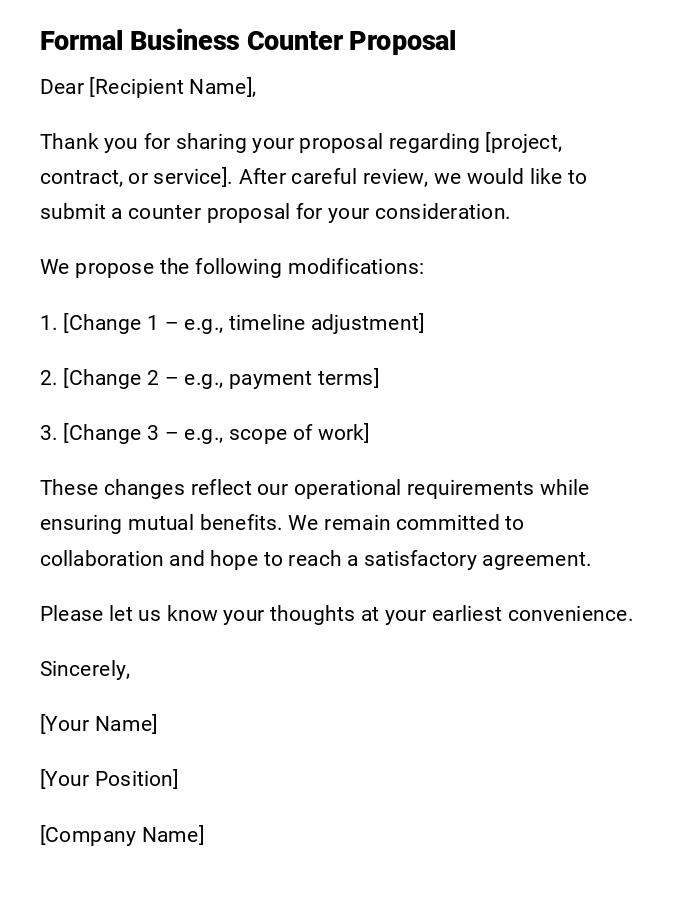
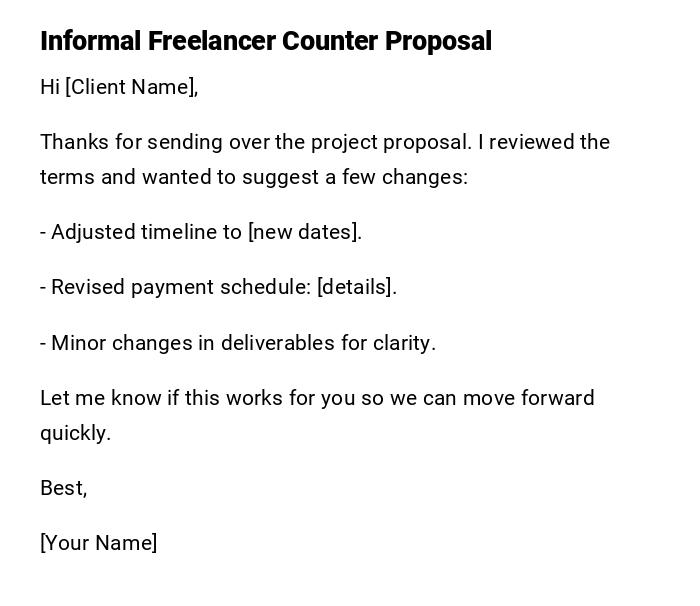
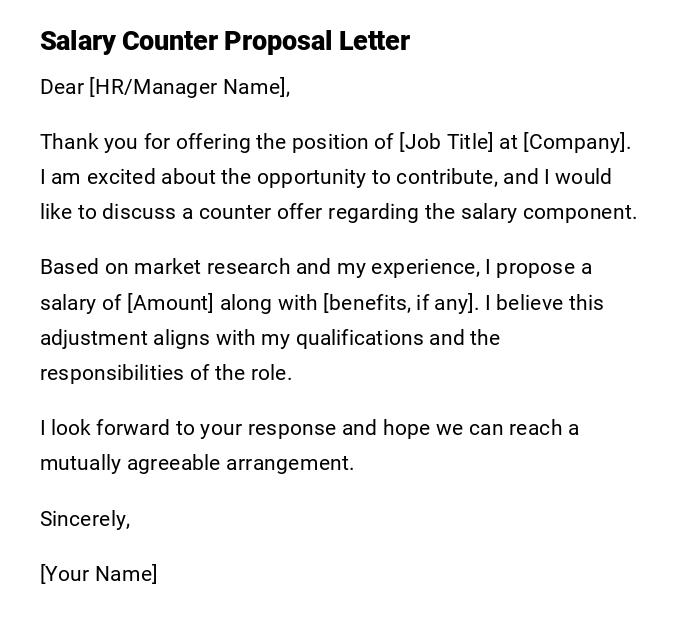
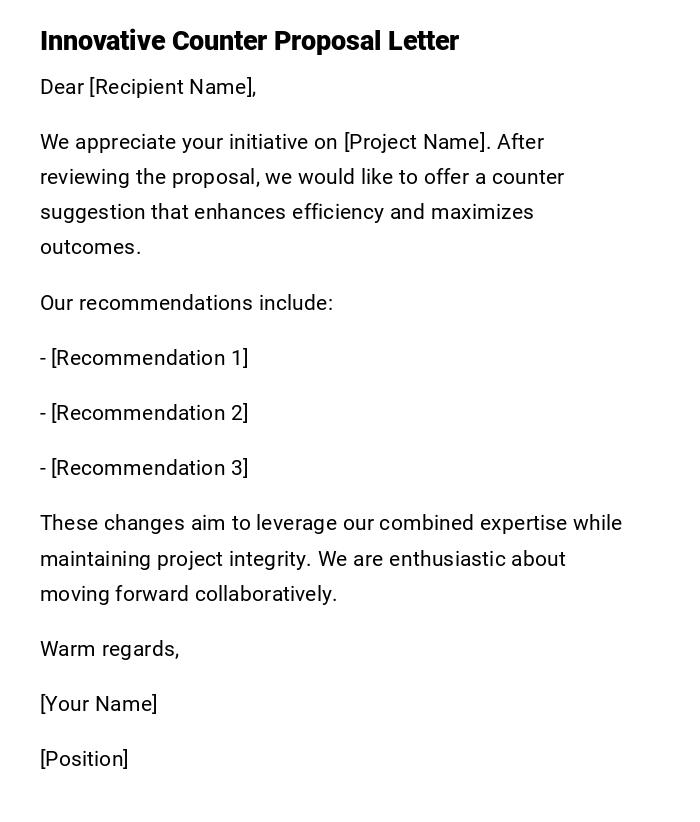
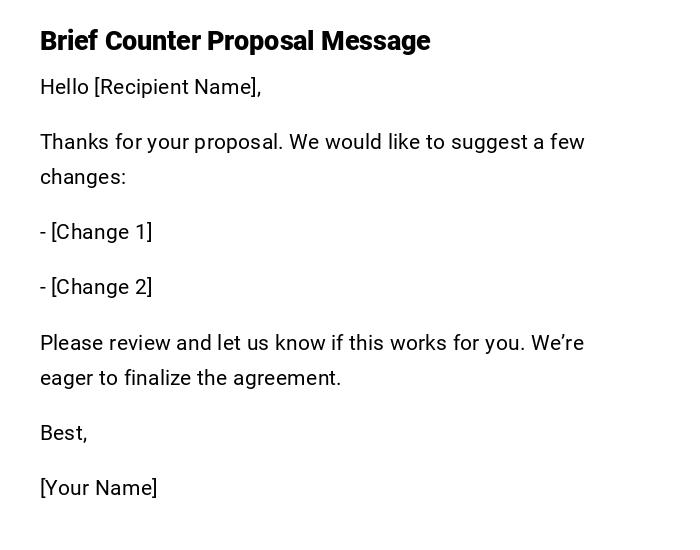
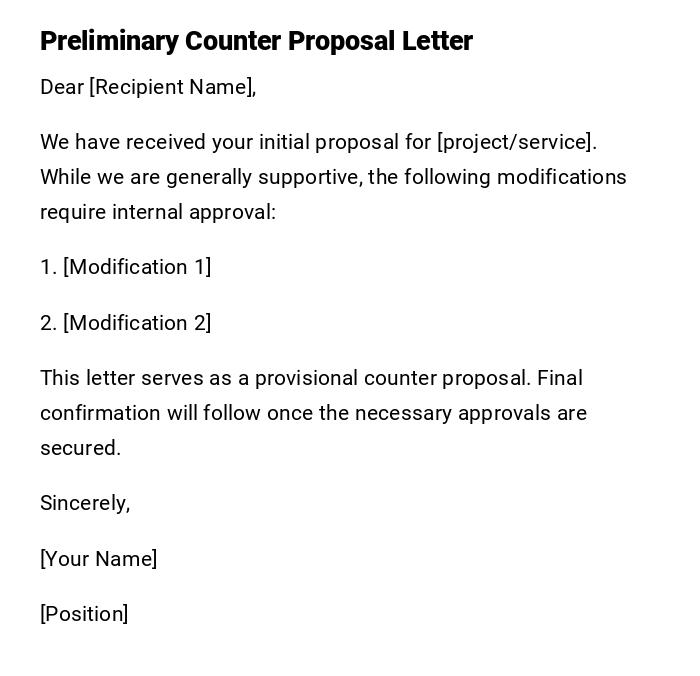
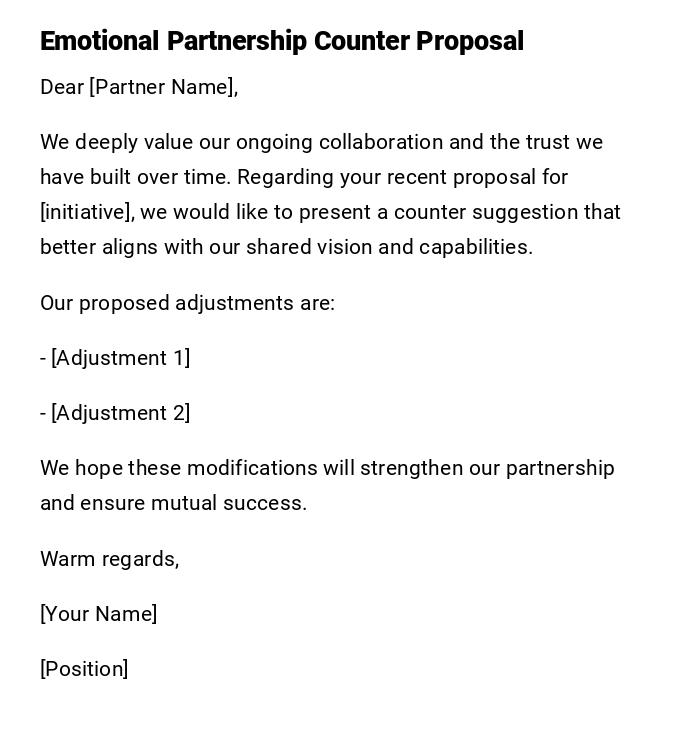

 Download Word Doc
Download Word Doc
 Download PDF
Download PDF